|

The end of the line for fish?:
Marine protected areas in Sri Lanka
Rajith DISSANAYAKE
There is an increasing awareness of environmental issues such as the
destruction of tropical rainforests and the onset of global warming.
Thanks to fossil fuels, environmental destruction and human population
have accelerated in tandem and the capacity for the environment to
mitigate alterations, like increasing levels of CO2 is severely reduced.
|
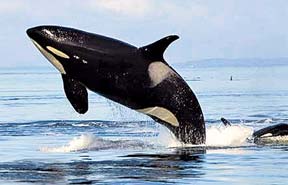
Killer whale. Courtesy: Google |
One problem that people are just waking up to is over-fishing, since
commercial fishing really took off in the 1950s. We've not taken the
problems in the sea seriously, because what goes on under the sea
happens invisibly and has not really made the news. Governments all over
the world, especially in wealthy countries have been pouring money into
increasing fishing capacity such that the populations of large fish have
now crashed by 90 percent since the 1950s, according to scientists.
Wild animals
Fishing is part of human civilisation. Whereas most of our food comes
from agriculture, fishing remains the one source of food that is still
largely hunted, the way our ancestors did. Fish are wild animals with
finite populations and in order for us to have enough of them, they have
to reproduce and grow at an adequate scale. Until relatively recently,
this was not a problem. Sailing ships and local marine harvesting could
not dent or impair ocean productivity to a large extent.
|
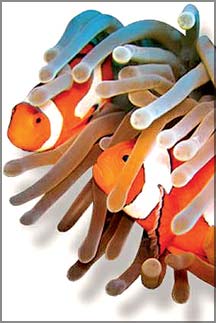
...beneath the sea |
Having said this, since the 16th Century, many marine animals have
plunged in numbers or gone extinct due to increasingly commercial
fishing. In the Atlantic where detailed records have been kept since
1600, it is estimated that there were 600 million green turtles with
untold numbers of seals and whales. Stocks of Atlantic cod fish were so
abundant that one could simply use baskets to fish them out. Gigantic
shoals of salmon swam up the rivers with individuals reaching five feet.
Historically, the waters off Sri Lanka must have burgeoned with marine
life on a scale that we can scarcely imagine, not to mention the fish in
our inland waters when rivers were so much larger, thanks to the
extensive forest cover that kept them full.
|
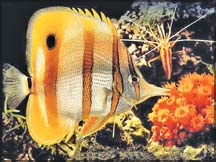
Beauty of the underwater world |
Most of the populations of Atlantic salmon have now gone and the cod
stocks are virtually extinct. In order to satisfy the taste for fish,
factory ships, particularly from Europe, the USA and Japan have been
fanning out in international waters in the hunt for commercially
valuable fish and these practices are threatening the food securities of
poorer countries. Unlike traditional fishing, a battle of man against
nature, the modern ships are equipped with radar, sonar and satellite
navigation.
Western Europe
They have vast holds in which to store hundreds of tonnes of fish and
the fish have no chance. UK environmental journalist Charles Clover has
highlighted the issues in his book The End of the Line. The book has now
been turned into a film (endoftheline.com) that is now been shown in
cinemas internationally. The times when we could imagine that there were
plenty more fish in the sea are long gone. Scientists estimate that at
the present level of fishing, most commercial stocks of fish will have
gone by 2050.
The nets of trawling ships are large enough to accommodate 13 jumbo
jets. Long line fishing involves lines of baited hooks that can be over
60 miles long. One of the biggest problems is the amount of life that is
destroyed and discarded as it does not represent the target species. As
much as 25 percent of everything caught or even more than 50 percent can
be thrown back - referred to as bycatch. Bycatch includes turtles,
sharks and seabirds. Western Europe is buying fishing concessions from
African waters from countries like Somalia. The Somalian fishermen can't
compete with factory fish leading to piracy, starvation and emigration.
These issues now affect Sri Lanka as never before.
The rich world is hungry for fish and fishing is not regulated in
international waters.
|
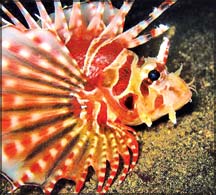
Colourful marine life |
Most of the fish sold in European supermarkets is now flown it or
shipped in from international waters including Sri Lanka. The pressure
on local fish stocks has never been greater. Westerners have a
particular attachment to tuna and Sri Lanka has now begun to export
species like the Yellowfin tuna, now displayed in UK supermarkets. Could
this have an impact on the local availability of fish? Unlike tea or
rubber, we don't take responsibility for replenishing the stocks of
fish.
We expect nature to do it all for us, and simply extract from the
sea. At low levels, it can be sustainable, but when it becomes big
business, unless the fish are given a chance, they will disappear.
Sri Lankan waters
Most vulnerable are larger species like shark, swordfish and the
bigger species of tuna. Europeans are yet to develop a taste for the
jackfish, so favoured by Sri Lankans. But the sea is not just about
food. Increasingly, wildlife documentaries are focusing in on the beauty
of ocean life and scuba diving for pleasure is becoming a mainstream
hobby. People will actually pay big money, not just to see whales, but
also to meet live sharks face to face. Whale watching is now developing
in Sri Lankan waters. In the Fiji Islands they are replanting corals to
recreate coral reefs.
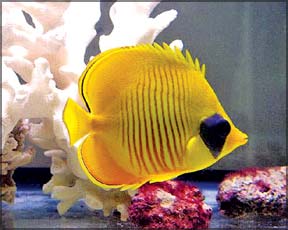
A group of tourists will pay up to $200 to dive into the reef and
watch sharks being fed by experienced diving guides. Most sharks are not
the dangerous man eaters they have been painted to be, ironically, we
kill them in hundreds of millions, partly to satisfy the demand for
Chinese shark fin soup.
Shark watching is more profitable than killing them for soup.
Enlightened governments in the Caribbean, South Africa, Australia, New
Zealand and Pacific islands are now setting up marine reserves. Areas of
the sea where no fishing is allowed. Fish stocks are booming outside the
perimeters of these reserves and many fishermen are now demanding marine
reserves, seeing fish stocks declining during their own careers.
Marine reserves help us evaluate what the oceans would look like if
it wasn't for our destructive impacts and help restore fish stocks.
Reservations on land have been understood for so long but only now is
there an interest in moving the concept to the seas.
Marine reserves
Consumers are also beginning to demand sustainably caught fish.
Increasingly, skipjack tuna caught using a single pole and line has
become very popular as this way of catching fish creates no bycatch and
unsuitable fish can be thrown back. No industrial net based fishing is
allowed by the Maldives where pole and line fishing is encouraged.
The fishermen on tall stilts in Sri Lanka catching one fish at a time
is the classic model of the most sustainable form of fishing. Islands in
the Pacific are joining forces to create marine reserves realising that
their fish stocks have no chance against the might of the fishing impact
from Europe and Japan.
One day, Sri Lanka will have marine reserves. Arthur C. Clarke, a
marine enthusiast was one for diving and his encouragement should bear
fruit. In Marine reserves or Marine Protected Areas (MPAs), tourists and
visitors will have the chance to explore and enjoy ocean bounty without
harming it, and fishermen should have more fish on the outskirts.
Tourists are seeking out the best international dive sites to see
coral reefs, sharks and whales. Diving and the recreational enjoyment of
the sea has never been more popular thanks to better equipment and more
publicity.
It should only be a matter of time before our legislators take action
and create MPAs. For the sake of future fish stocks and the tourist
dollar - and also to help satisfy our curiosity about what's down there
and go and take a look ourselves, rather than just thinking about fish
on a plate. |



